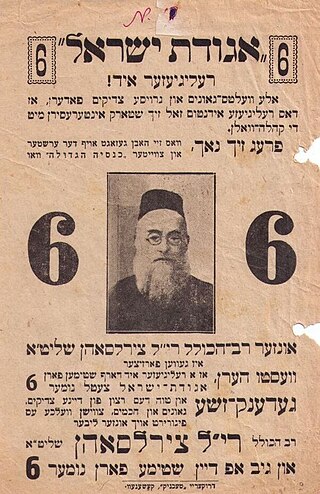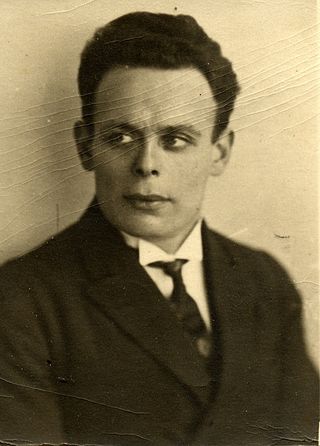Bernstein is a common surname of German origin, meaning "amber". The name is used by both Germans and Jews, although it is most common among people of Ashkenazi Jewish heritage. The German pronunciation is, but in English, it is pronounced either as or.

Ze'ev Jabotinsky was a Revisionist Zionist leader, author, poet, orator, soldier, and founder of the Jewish Self-Defense Organization in Odessa.

The Kishinev pogrom or Kishinev massacre was an anti-Jewish riot that took place in Kishinev, then the capital of the Bessarabia Governorate in the Russian Empire, on 19–21 April [O.S. 6–8 April] 1903. During the pogrom, which began on Easter Day, 49 Jews were killed, 92 were gravely injured, a number of Jewish women were raped, over 500 were lightly injured and 1,500 homes were damaged. American Jews began large-scale organized financial help, and assisted in emigration. The incident focused worldwide attention on the persecution of Jews within the Russian Empire, and led Theodor Herzl to propose the Uganda Scheme as a temporary refuge for the Jews.

The history of the Jews in Moldova reaches back to the 1st century BC, when Roman Jews lived in the cities of the province of Lower Moesia. Bessarabian Jews have been living in the area for some time. Between the 4th-7th centuries AD, Moldova was part of an important trading route between Asia and Europe, and bordered the Khazar Khaganate, where Judaism was the state religion. Prior to the Second World War, violent antisemitic movements across the Bessarabian region badly affected the region's Jewish population. In the 1930s and '40s, under the Romanian governments of Octavian Goga and Ion Antonescu, government-directed pogroms and mass deportations led to the concentration and extermination of Jewish citizens followed, leading to the extermination of between 45,000-60,000 Jews across Bessarabia. The total number of Romanian and Ukrainian Jews who perished in territories under Romanian administration is between 280,000 and 380,000.
The First Aliyah, also known as the agriculture Aliyah, was a major wave of Jewish immigration (aliyah) to Ottoman Palestine between 1881 and 1903. Jews who migrated in this wave came mostly from Eastern Europe and from Yemen, stimulated by pogroms and violence against the Jewish communities in those areas. An estimated 25,000 Jews immigrated. Many of the European Jewish immigrants during the late 19th-early 20th century period gave up after a few months and went back to their country of origin, often suffering from hunger and disease.

The Jewish Territorial Organisation, known as the ITO, was a Jewish political movement which first arose in 1903 in response to the British Uganda Scheme, but only institutionalized in 1905. Its main goal was to find an alternative territory to that of Palestine, which was preferred by the Zionist movement, for the creation of a Jewish homeland. The organization embraced what became known as Jewish Territorialism also known as Jewish Statism. The ITO was dissolved in 1925.

Yehuda Leib Tsirelson was the Chief Rabbi of Bessarabia, a member of the Romanian parliament, and a prominent Jewish leader and posek.
As an organized nationalist movement, Zionism is generally considered to have been founded by Theodor Herzl in 1897. However, the history of Zionism began earlier and is intertwined with Jewish history and Judaism. The organizations of Hovevei Zion, held as the forerunners of modern Zionist ideals, were responsible for the creation of 20 Jewish towns in Palestine between 1870 and 1897.

Leo Motzkin was a Ukrainian Zionist leader. A leader of the World Zionist Congress and numerous Jewish and Zionist organizations, Motzkin was a key organizer of the Jewish delegation to the 1919 Paris Peace Conference and one of the first Jewish leaders to organize opposition to the Nazi Party in Germany.

Nahum Gergel was a Jewish rights activist, humanitarian, sociologist, and author in Yiddish. Nahum Gergel is best known for his thorough statistical studies of anti-Jewish atrocities (pogroms) that took place in Ukraine in 1918–1921.
Pogroms in the Russian Empire were large-scale, targeted, and repeated anti-Jewish rioting that began in the 19th century. Pogroms began to occur after Imperial Russia, which previously had very few Jews, acquired territories with large Jewish populations from the Polish–Lithuanian Commonwealth and the Ottoman Empire from 1772 to 1815. These territories were designated "the Pale of Settlement" by the Imperial Russian government, within which Jews were reluctantly permitted to live. The Pale of Settlement primarily included the territories of Poland, Ukraine, Belarus, Bessarabia, Lithuania and Crimea. Jews were forbidden from moving to other parts of European Russia, unless they converted from Judaism or obtained a university diploma or first guild merchant status. Migration to the Caucasus, Siberia, the Far East or Central Asia was not restricted.

Israel Belkind was a Jewish educator, author, writer, historian and founder of the Bilu movement. A pioneer of the First Aliyah, Belkind founded the Biluim, a group of Jewish idealists aspiring to settle in the Land of Israel with the political purpose to redeem Eretz Yisrael and re-establish the Jewish State on it.

Miriam Bernstein-Cohen, 1895–1991, was an Israeli actress, director, poet and translator.
Antisemitism in the Russian Empire included numerous pogroms and the designation of the Pale of Settlement from which Jews were forbidden to migrate into the interior of Russia, unless they converted to the Russian Orthodox state religion.
Jakob Edelstein was a Czechoslovak Zionist, social democrat and the first Jewish Elder in the Theresienstadt ghetto. He was murdered in Auschwitz-Birkenau.

The Jewish left consists of Jews who identify with, or support, left-wing or left-liberal causes, consciously as Jews, either as individuals or through organizations. There is no one organization or movement which constitutes the Jewish left, however. Jews have been major forces in the history of the labor movement, the settlement house movement, the women's rights movement, anti-racist and anti-colonialist work, and anti-fascist and anti-capitalist organizations of many forms in Europe, the United States, Australia, Algeria, Iraq, Ethiopia, South Africa, and modern-day Israel. Jews have a history of involvement in anarchism, socialism, Marxism, and Western liberalism. Although the expression "on the left" covers a range of politics, many well-known figures "on the left" have been of Jews who were born into Jewish families and have various degrees of connection to Jewish communities, Jewish culture, Jewish tradition, or the Jewish religion in its many variants.

Israel Cohen was an Anglo-Jewish, Zionist leader, writer, and journalist, who served as secretary of the World Zionist Organization.

Tze'irei Zion was a Labor Zionist youth movement in Eastern Europe, in the first half of the 20th century that branched into the Palestine. The movement originated at the very beginning of the 20th century in the Russian Empire.
Moyshe Katz (1885–1960) was a Russian–American writer, Zionist, and proponent of Yiddish culture.












